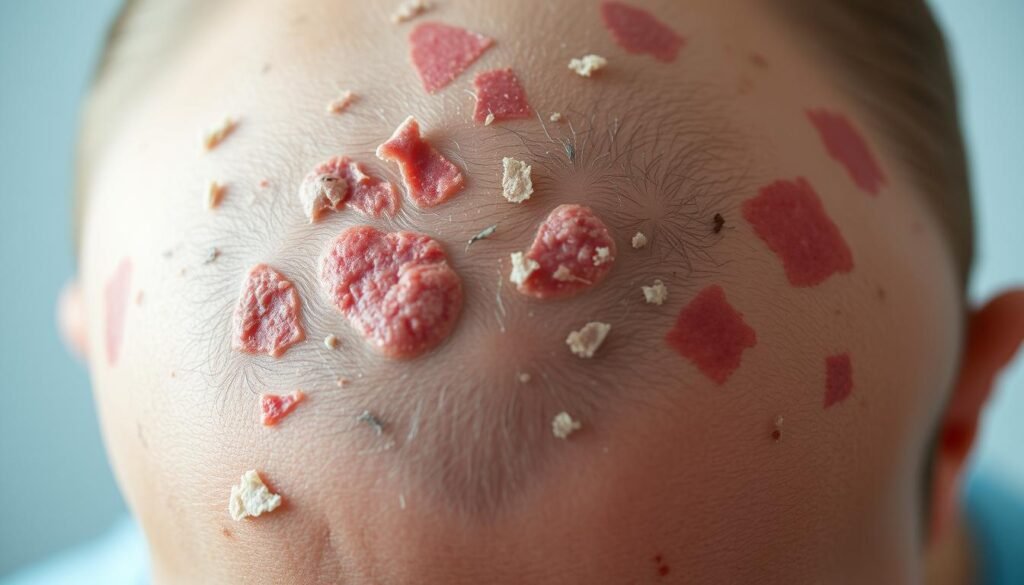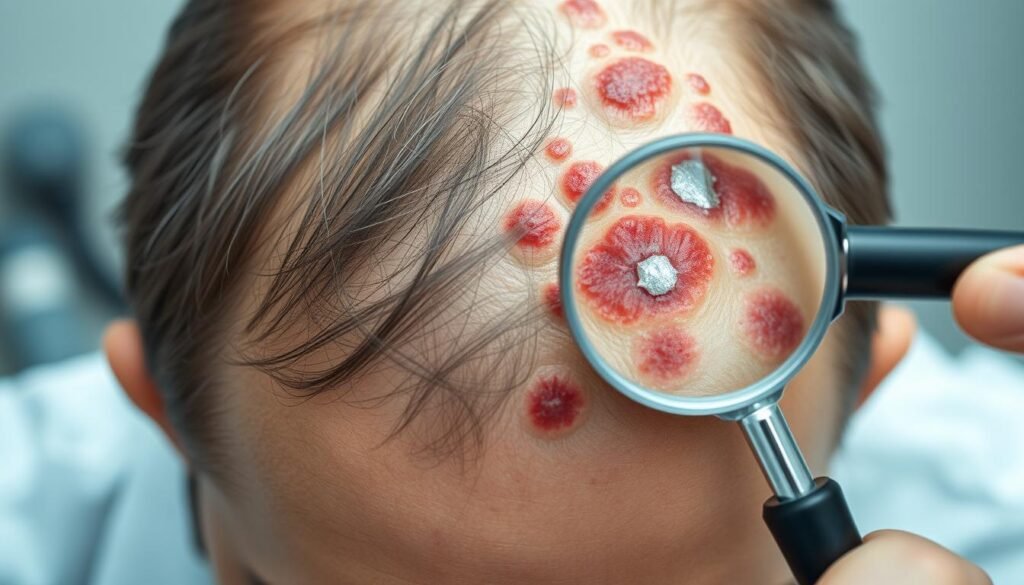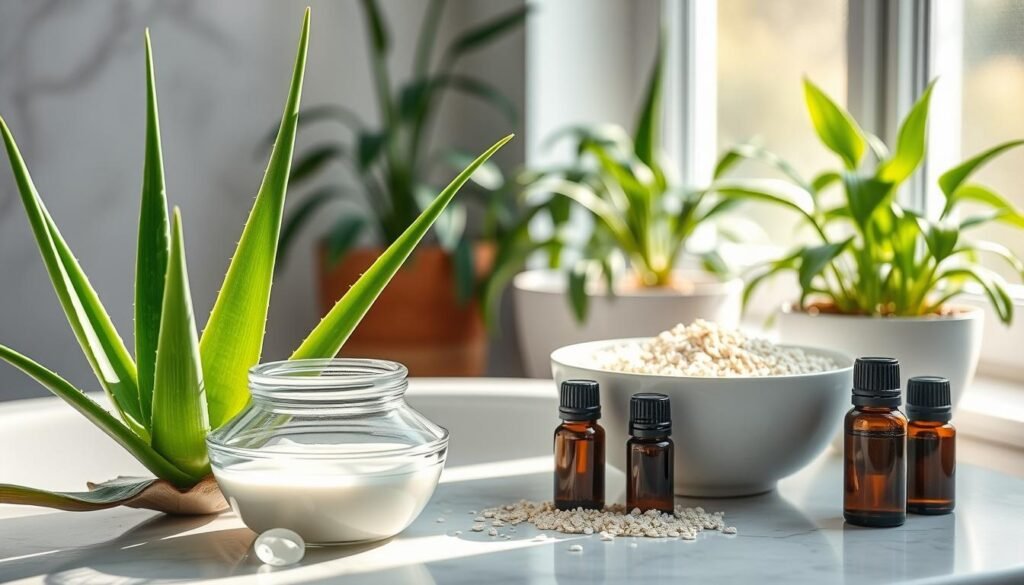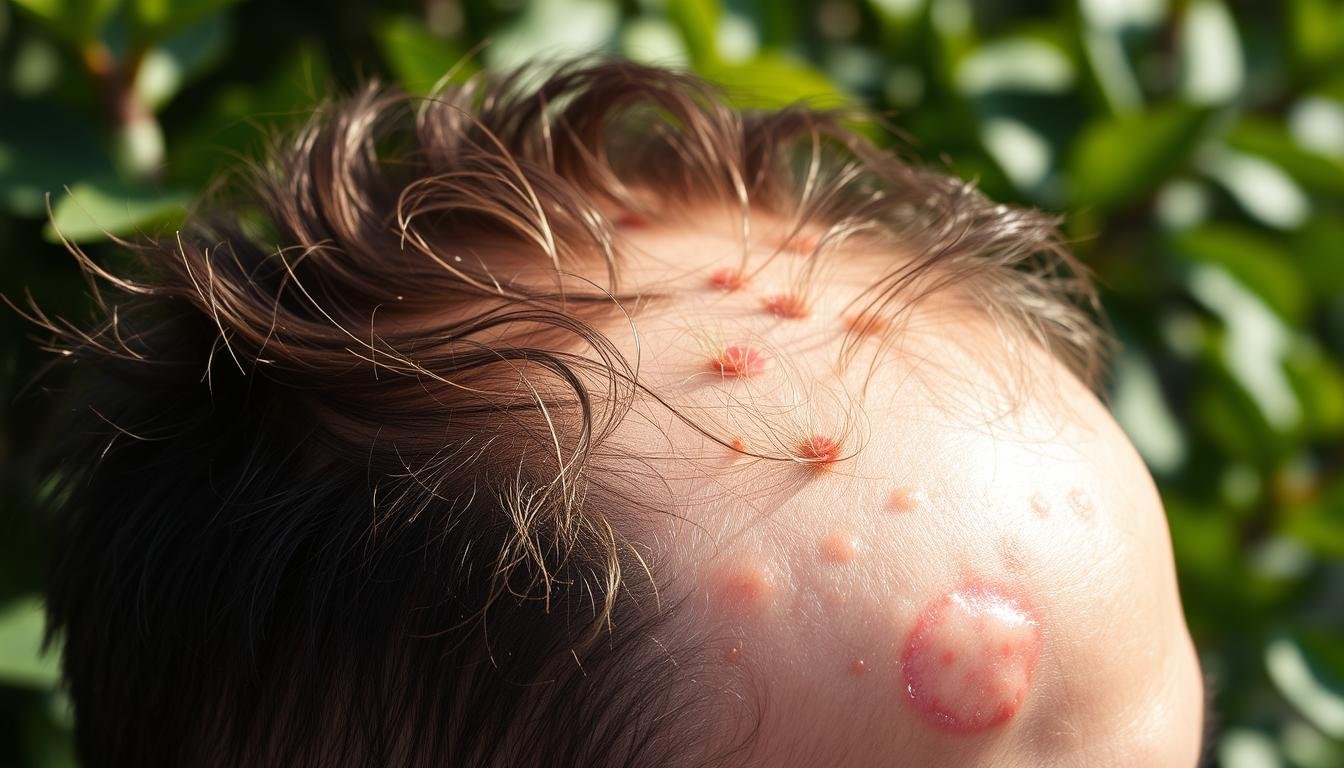How to Deal with Scalp Psoriasis | Expert Guide
At least half of people with psoriasis have it on their scalp, a condition that can cause everything from mild scaling to severe crusting across the entire scalp, sometimes extending to the forehead, nose, beard area, and ears. While there’s no cure for scalp psoriasis, various treatments and management strategies can help control the symptoms and improve quality of life.
In this comprehensive guide, we’ll explore the Causes, symptoms, diagnosis, and effective treatments for scalp psoriasis, so you can take back control of your hair and skin health. Whether you’re dealing with a mild case or a more severe flare-up, you’ll learn from the experts how to manage this challenging condition and find relief.
Key Takeaways
- Scalp psoriasis affects at least 50% of people with psoriasis, causing a range of symptoms from mild scaling to severe crusting.
- While there’s no cure, various treatments like topicals, phototherapy, and systemic medications can help manage the condition.
- Scalp psoriasis can be difficult to treat due to the location, but following the right treatment plan is crucial for successful outcomes.
- Over-the-counter products, home remedies, and lifestyle changes can also provide relief for those with mild to moderate scalp psoriasis.
- Seeking the guidance of a dermatologist is recommended, especially for more severe cases or if psoriatic arthritis is a concern.
Understanding Scalp Psoriasis: Causes and Symptoms
Scalp psoriasis is a chronic autoimmune condition that causes the rapid growth of skin cells on the Scalp. This leads to the formation of red, itchy patches covered with silvery-white scales that can resemble severe dandruff. The severity of scalp psoriasis symptoms can range from mild, with slight flaking, to moderate or severe, involving extensive scaly plaques, hair loss, and significant discomfort.
What is Scalp Psoriasis?
Scalp psoriasis is a form of the chronic skin condition psoriasis that specifically affects the Scalp. It is characterized by red, inflamed patches of skin with a distinctive silvery-white appearance due to the rapid buildup of skin cells. This accumulation of scales can cause the scalp to feel dry, itchy, and uncomfortable.
Common Symptoms to Look For
The most common scalp psoriasis symptoms include:
- Reddish, inflamed patches on the scalp
- Silvery-white or gray scales that may flake off
- Dry, itchy, and sometimes painful scalp
- Dandruff-like flaking of the skin
- Temporary hair loss in affected areas
Triggers That Make Symptoms Worse
While the exact cause of scalp psoriasis scalp care is not fully understood, various factors have been identified as potential triggers for flare-ups:
- Stress
- Skin injuries or trauma
- Certain medications, such as lithium or prednisone
- Infections, particularly streptococcal infections
- Cold, dry weather
- Excessive alcohol consumption
Understanding these triggers and avoiding them, when possible, can help manage the symptoms and prevent further aggravation of scalp psoriasis.

Diagnosis of Scalp Psoriasis
Diagnosing scalp psoriasis requires a professional consultation with a dermatologist. These skin specialists utilize a thorough visual examination of the scalp and sometimes other affected areas to assess the condition. In some cases, they may also perform a skin biopsy to confirm the diagnosis or rule out other similar skin disorders.
How Dermatologists Diagnose Scalp Psoriasis
During a dermatologist consultation, the doctor will closely examine the patient’s scalp for telltale signs of psoriasis, such as thick, scaly patches, redness, and silvery-white scales. They may also inquire about the individual’s medical history and any triggering factors that worsen the symptoms. A skin biopsy, where a small sample of skin is taken for analysis, may be done to definitively confirm the diagnosis of scalp psoriasis.
Importance of a Professional Diagnosis
Obtaining a professional dermatologist consultation and diagnosis is crucial for individuals experiencing scalp psoriasis. It allows the healthcare provider to determine the severity of the condition and develop an appropriate treatment plan. Early diagnosis and management are key to controlling symptoms, preventing complications, and improving overall skin health. By working closely with a dermatologist, patients can better understand their condition and explore the most effective therapies to manage their scalp psoriasis effectively.

Remember, a professional diagnosis from a dermatologist is essential for understanding the nature and extent of your scalp psoriasis, as well as for creating a tailored treatment approach. Don’t hesitate to seek Expert guidance to take control of your skin health and find relief from the discomfort of this chronic condition.
Treatment Options for Scalp Psoriasis
Scalp psoriasis can be a challenging condition to manage, but there are several effective treatment options available. The choice of treatment often depends on the severity of the symptoms, previous response to treatments, and the presence of psoriasis elsewhere on the body. A combination of therapies may be used for better results.
Topical Treatments
Topical treatments are often the first line of defense for scalp psoriasis. These include corticosteroids, calcipotriene, tazarotene, and medicated shampoos. Topical steroids come in various formulations, such as lotions, gels, foams, sprays, or shampoos, and are designed specifically for the scalp. Vitamin D analogues like calcipotriene are also available in different formulations and are typically applied once or twice a day. Tar-based products, such as shampoos, gels, and ointments, can be effective in softening thick, adherent scale on the scalp.
Phototherapy Options
For those who don’t respond well to topical treatments, phototherapy can be a helpful option. This involves the use of ultraviolet light, either UVB or PUVA (psoralen plus UVA) therapy. Phototherapy can be an effective treatment for scalp psoriasis that has not responded to other therapies.
Systemic Medications
In more severe cases of scalp psoriasis, or when the condition is present on other parts of the body, systemic medications may be prescribed. These include biologics, methotrexate, cyclosporine, and oral retinoids. Systemic treatments work by targeting the underlying immune response that drives the condition, but they also carry a higher risk of side effects, so patients should be closely monitored by their healthcare provider.
Regardless of the treatment approach, it’s important to be patient and consistent, as it can take several weeks to gain adequate control of the condition. If there is no improvement after 4 weeks of continuous treatment, it’s recommended to return to the doctor or nurse for further assessment and potential adjustments to the treatment plan.

Home Remedies for Scalp Psoriasis Relief
Living with scalp psoriasis can be challenging, but incorporating natural remedies into your treatment plan may provide much-needed relief. While seeking professional medical care is essential, exploring home-based solutions can complement your overall approach to managing this chronic skin condition.
Natural Ingredients to Consider
Several natural ingredients have shown promise in alleviating the symptoms of scalp psoriasis. For instance, aloe vera creams with a 0.5% concentration can help reduce itching, inflammation, and flaking when used up to three times daily. Similarly, Mahonia aquifolium creams with a 10% concentration may help reduce inflammation and improve the appearance of the scalp.
Lifestyle Changes That Help
Making adjustments to your lifestyle can also play a significant role in managing scalp psoriasis. Reducing stress through relaxation techniques, regular exercise, and proper sleep can help minimize flare-ups. Additionally, incorporating omega-3 fatty acid supplements into your diet may reduce inflammation and the severity of your symptoms.
Dietary Adjustments for Better Skin Health
Your diet can also impact the health of your skin, including your scalp. Increasing your intake of anti-inflammatory foods, such as those rich in omega-3s, and reducing your consumption of inflammatory foods, like processed and sugary items, may contribute to better skin health and reduced scalp psoriasis symptoms.
Remember, it’s essential to consult with a healthcare professional before trying any new home remedies or making significant lifestyle changes, as they can provide personalized guidance and ensure your safety.

“Incorporating natural ingredients and making lifestyle adjustments can be a valuable complement to professional medical treatment for scalp psoriasis.”
Over-the-Counter Products for Scalp Psoriasis
When it comes to managing scalp psoriasis, over-the-counter (OTC) products can provide much-needed relief. These accessible treatments include medicated shampoos, creams, gels, ointments, foams, and soaps that target the root causes of this chronic skin condition.
Types of OTC Treatments Available
Look for active ingredients like salicylic acid, coal tar, zinc pyrithione, or selenium sulfide in OTC psoriasis products. These ingredients can help soften scales, reduce inflammation, and ease the itchiness associated with scalp psoriasis. Some popular OTC options include Selsun Blue, Nizoral Anti-Dandruff Shampoo, and medicated creams containing hydrocortisone or calamine.
How to Choose the Right Product
When selecting an OTC product for scalp psoriasis, consider the severity of your symptoms, your hair type, and any allergies or sensitivities you may have. Start with milder formulas and gradually introduce more potent treatments if the initial products do not provide sufficient relief. If symptoms persist or worsen, it’s best to consult a dermatologist for professional guidance and a personalized treatment plan.
| Product | Active Ingredient | Average Price |
|---|---|---|
| Selsun Blue | Selenium Sulfide | $30 on Amazon, $16 at Walmart |
| Nizoral Anti-Dandruff Shampoo | Ketoconazole | $30 on Amazon, $16 at Walmart |
| Hydrocortisone Cream | Hydrocortisone | $5-$10 at drugstores |
| Calamine Lotion | Calamine | $2-$5 at drugstores |
By exploring the range of OTC psoriasis products and tailoring your treatment to your individual needs, you can take an important step towards managing the symptoms of scalp psoriasis and achieving greater comfort and confidence.

Managing Itchiness and Discomfort
Dealing with the persistent itchiness and discomfort associated with scalp psoriasis can be challenging, but there are several effective strategies to find relief. One of the key steps is maintaining a scalp care routine that incorporates moisturizing products to hydrate the skin and reduce irritation.
Tips for Alleviating Itchiness
Incorporate the following techniques to help alleviate the itchiness caused by scalp psoriasis:
- Use a gentle, non-irritating shampoo and conditioner after washing your hair, avoiding hot water and harsh scrubbing.
- Apply a cold compress or wet towel to the affected areas to soothe the itch and reduce inflammation.
- Consider over-the-counter medicated shampoos containing ingredients like coal tar, menthol, or phenol, which can help calm the itch.
The Role of Moisturizers
Maintaining proper skin hydration is crucial in managing the discomfort associated with scalp psoriasis. Regularly applying moisturizers, particularly after showering or bathing, can help restore the skin’s protective barrier and alleviate dryness and itchiness.
When to Seek Medical Help
If the itching becomes severe, persistent, or affects your sleep, it’s important to seek medical attention. Severe or worsening itchiness may be a sign of an infection or a need for more advanced treatment options. Your dermatologist can provide guidance on the best course of action to manage your scalp psoriasis and associated symptoms.

“Scratching induces trauma, which in turn induces psoriasis, known as Koebnerization.”
The Importance of a Scalp Care Routine
Maintaining a consistent scalp care routine is essential for managing scalp psoriasis. This condition can cause itchy, flaky, and inflamed skin on the scalp, leading to discomfort and self-consciousness. By establishing a dedicated scalp care regimen, individuals with psoriasis can better control their symptoms and prevent future flare-ups.
Establishing a Consistent Routine
The key to an effective scalp care routine is consistency. Incorporate the following steps into your daily or weekly regimen:
- Gentle cleansing: Use a mild, fragrance-free shampoo and lukewarm water to cleanse the scalp. Avoid harsh scrubbing, which can further irritate the skin.
- Moisturizing: Apply a hydrating, non-comedogenic scalp serum or oil to lock in moisture and soothe inflammation.
- Targeted treatment: If prescribed, apply any medicated creams, ointments, or solutions directly to the affected areas of the scalp.
Recommended Hair Care Products
When managing scalp psoriasis, it’s crucial to choose hair care products that are gentle and tailored to sensitive skin. Look for shampoos, conditioners, and styling products that are free from harsh chemicals, such as sulfates, parabens, and fragrances. Opt for formulas that contain soothing and nourishing ingredients like psoriasis scalp care and hair care routine essentials like coal tar, salicylic acid, or hydrocortisone.
Regularly maintaining a scalp care routine can help alleviate the symptoms of psoriasis and prevent future flare-ups. By incorporating gentle cleansing, moisturizing, and targeted treatments, individuals with this condition can take control of their scalp health and regain confidence in their appearance.

Coping with the Emotional Impact of Scalp Psoriasis
Scalp psoriasis can have a significant emotional and psychological impact on individuals living with the condition. Recognizing and addressing the mental health challenges associated with scalp psoriasis is crucial for overall well-being. One study found that people with psoriasis have higher chances for depression and anxiety, and a third of adults with psoriasis say it interferes with their love life.
Recognizing Mental Health Challenges
Individuals with scalp psoriasis may experience a range of emotional and mental health challenges, including:
- Anxiety about the appearance of their scalp and the social stigma associated with the condition
- Depression due to the chronic and unpredictable nature of the disease
- Low self-esteem and feelings of embarrassment or shame about their skin condition
Support Groups and Counseling Options
Joining a support group can provide a sense of community and shared experiences, helping individuals with scalp psoriasis feel less alone. Many psoriasis organizations, such as the National Psoriasis Foundation, offer resources and support groups for coping with the emotional aspects of the condition.
In addition, seeking professional counseling or therapy can be highly beneficial in addressing the mental health challenges associated with scalp psoriasis. Cognitive behavioral therapy, for example, can be especially helpful for those struggling with negative emotions related to their condition.

Remember, managing the emotional impact of scalp psoriasis is just as important as managing the physical symptoms. By recognizing the mental health challenges and seeking support, individuals can improve their overall well-being and quality of life while navigating their scalp psoriasis journey.
Preventing Flare-Ups
Preventing scalp psoriasis flare-ups is crucial for managing this chronic skin condition. By identifying personal triggers and making long-term lifestyle changes, individuals can take proactive steps to minimize the frequency and severity of their symptoms.
Identifying Personal Triggers
Recognizing the specific factors that can trigger a scalp psoriasis flare-up is the first step in prevention. Common triggers include:
- Stress
- Certain foods
- Alcohol consumption
- Smoking
- Environmental factors, such as dry, cold weather or sunburn
Keeping a detailed journal can help you identify your personal triggers. This will allow you to anticipate and avoid these triggers, reducing the risk of a flare-up.
Long-term Lifestyle Changes
Making long-term lifestyle changes can be instrumental in preventing scalp psoriasis flare-ups. Some key strategies include:
- Practicing stress-reduction techniques, such as meditation, yoga, or deep breathing exercises.
- Maintaining a healthy, balanced diet rich in fruits, vegetables, and lean proteins.
- Limiting alcohol consumption and quitting smoking, if applicable.
- Protecting your scalp from excessive sun exposure by using a wide-brimmed hat or applying sunscreen.
- Keeping your scalp moisturized with gentle, fragrance-free products to prevent dryness and irritation.
Regular check-ups with a dermatologist can also help monitor your condition and adjust your treatment plan as needed, further reducing the risk of scalp psoriasis flare-ups.

“The key to managing scalp psoriasis is being proactive and taking steps to prevent flare-ups. By understanding your personal triggers and making lifestyle changes, you can take control of your condition and enjoy better skin health.”
When to Consult a Specialist
If your scalp psoriasis persists despite over-the-counter treatments or causes significant discomfort that affects your quality of life, it’s time to consult a dermatologist. Signs that you need Expert help include severe itching, extensive hair loss, signs of infection, or psoriasis spreading to other parts of your body.
Signs You Need Expert Help
Scalp psoriasis can be tricky to manage on your own, especially if the symptoms are severe or persistent. Consult a dermatologist if you experience any of the following: persistent flaky or scaly patches on your scalp, intense itching that disrupts your sleep, visible hair loss, or signs of infection like redness, swelling, or pus. These are all indications that your condition requires professional evaluation and treatment.
What to Expect in a Specialist Visit
During a visit with a dermatologist, you can expect a thorough examination of your scalp and potentially other affected areas. The specialist may perform tests, discuss your medical history, and develop a personalized treatment plan to manage your specific case of scalp psoriasis. This could involve a combination of topical medications, phototherapy, or systemic medications aimed at slowing the rapid growth of skin cells. With the expertise of a dermatologist, you can find the most effective solutions to control your scalp psoriasis and improve your overall skin health.
FAQ
What is scalp psoriasis?
Scalp psoriasis is a chronic autoimmune condition that causes rapid skin cell growth on the scalp, leading to the formation of red, itchy patches and silvery-white scales.
What are the common symptoms of scalp psoriasis?
Common symptoms of scalp psoriasis include red, itchy patches, silvery-white scales, and dandruff-like flaking. The severity can range from mild scaling to severe crusting on the entire scalp, sometimes extending to the forehead, nose, beard area, and ears.
What are the potential triggers for scalp psoriasis?
Triggers for scalp psoriasis may include stress, infections, skin injuries, certain medications, cold weather, and alcohol consumption.
How is scalp psoriasis diagnosed?
Dermatologists diagnose scalp psoriasis through a visual examination of the scalp and sometimes other affected areas. They may also perform a skin biopsy to confirm the diagnosis or rule out other conditions.
What are the treatment options for scalp psoriasis?
Treatment options for scalp psoriasis include topical treatments, phototherapy, and systemic medications. Topical treatments involve the use of corticosteroids, calcipotriene, tazarotene, and medicated shampoos. Phototherapy uses UVB light or PUVA therapy, while systemic medications include biologics, methotrexate, cyclosporine, and oral retinoids.
Can home remedies help manage scalp psoriasis?
Yes, home remedies can complement medical treatments for scalp psoriasis. Natural ingredients like aloe vera, tea tree oil, and apple cider vinegar may provide relief. Lifestyle changes, such as stress reduction, regular exercise, and proper sleep, can also help manage symptoms. Dietary adjustments, including increasing omega-3 fatty acids and reducing inflammatory foods, may contribute to better skin health.
What over-the-counter (OTC) products are available for scalp psoriasis?
OTC products for scalp psoriasis include medicated shampoos, creams, gels, ointments, foams, and soaps. Look for active ingredients like salicylic acid, coal tar, zinc pyrithione, or selenium sulfide, which can help soften scales, reduce inflammation, and ease itching.
How can I manage the itchiness and discomfort associated with scalp psoriasis?
To manage itchiness and discomfort, use conditioners after shampooing, limit hot tools for styling, apply wet towels or cold packs to itchy spots, and use OTC tar shampoos or those with menthol or phenol. Moisturizers also play a vital role in maintaining skin hydration and reducing itchiness.
Why is a consistent scalp care routine important for managing scalp psoriasis?
A consistent scalp care routine is essential for managing scalp psoriasis. This includes gentle cleansing, moisturizing, and applying prescribed treatments. Using lukewarm water and hair care products specifically designed for sensitive scalps or those with psoriasis can help control symptoms and prevent flare-ups.
How can the emotional and psychological impact of scalp psoriasis be addressed?
Scalp psoriasis can have significant emotional and psychological impacts. It’s important to recognize signs of anxiety, depression, or low self-esteem related to the condition. Joining support groups, seeking counseling or therapy, and utilizing resources from psoriasis organizations can help address the mental health challenges associated with the condition.
How can I prevent flare-ups of scalp psoriasis?
Preventing flare-ups involves identifying personal triggers and making long-term lifestyle changes. Common triggers include stress, certain foods, alcohol, smoking, and environmental factors. Keeping a journal to track potential triggers, implementing stress-reduction techniques, maintaining a healthy diet, limiting alcohol consumption, quitting smoking, and protecting your scalp from excessive sun exposure can all help prevent flare-ups.
When should I consult a specialist for my scalp psoriasis?
You should consult a specialist if your scalp psoriasis persists despite over-the-counter treatments, causes significant discomfort, or affects your quality of life. Signs that you need expert help include severe itching, extensive hair loss, signs of infection, or psoriasis spreading to other parts of the body. During a specialist visit, they will perform a thorough examination and develop a tailored treatment plan to manage your specific case of scalp psoriasis.





